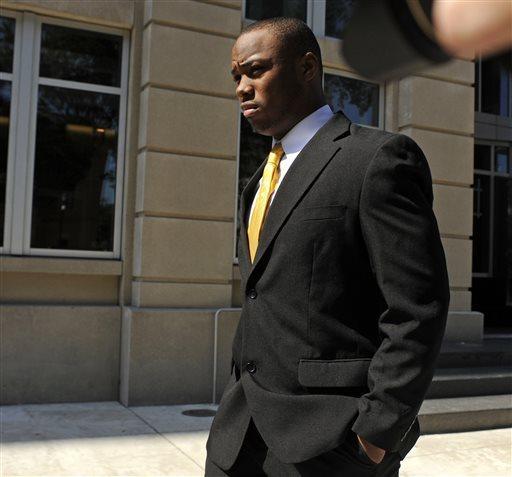It only took 25 seconds, but Jeremy Hill seemingly said all the right things.
He thanked LSU, thanked his head coach, promised to do better, threw the word “apologize” in and was on his merry way, wearing the same carefree smile he had as he sauntered into the LSU team room just minutes earlier.
For the first time since he blindsided his 20-year-old victim outside Reggie’s Bar last April, Hill feebly attempted to rectify what he had done — only after he was assured his spot on the LSU football team was secure.
There were four months between the incident and this evening’s news conference. During that time, Hill did nothing but prolong the inevitable. He cowered away from facing the media. The fans and the state who grew accustomed to cheering Hill breaking through blocks were left to only wildly speculate what happened on that warm April night.
He had an active Twitter account. So active, in fact, he ignited controversy during Ole Miss freshman Robert Nkemdiche’s February official visit to Baton Rouge. He claimed Mike’s Daiquiris & Grill treated he and his recruit “like thrash” and vowed no LSU player would ever step foot in the bar.
Why not post a message to Tiger fans there? A simple “I’m sorry, I’ll make it right” only takes 29 characters, Jeremy.
Instead, he deleted the account.
LSU associate sports information director Bill Martin couldn’t pinpoint the exact date Hill ceased his tweeting. But he did confirm Hill did not ever tweet after his arrest.
In today’s sports landscape, it’s become apparent appearance is everything. Hill’s cowardice in the wake of the fight raised questions among outsiders not even the most well-connected LSU fan could answer.
Was he sorry? Did he mean to do it? Why did he high-five accomplice Robert Bayardo as the victim hit the concrete?
And most importantly: How, Jeremy Hill, could you make the same mistake again?
In case you’ve forgotten, it was only two years ago that Hill faced oral sexual battery charges. Charges that carry a maximum sentence of 10 years in prison.
He pleaded guilty to lesser charges. Instead of wearing orange and black, he was donning the purple and gold. We never heard much from Hill on the incident, just the usual aimless drivel we heard again tonight after his second arrest.
So it’s hard for me to make sense of what I saw tonight. There was no authenticity. No true remorse. It seemed that the news conference was just a blip on Hill’s radar. Something impeding him on his way to another night in the life of a college athlete.
Given the circumstances, Hill had every right to be apprehensive. And maybe he was. But his tone of voice and lighthearted demeanor as he entered the room suggested otherwise.
I asked Les Miles if Hill came to speak to reporters out of his own free will or had he forced his leading rusher to face the music. Miles quickly assured me Hill wanted to come.
But because Hill shied away from the spotlight he brought upon himself, I’ll never truly know what I saw.
As I listened back to Hill’s brief statement, the last phrase struck me.
“I’ll continue to be a role model for the kids in the community,” Hill said before he was whisked away.
Role models are put on a pedestal. They’re the people fathers wish their sons grow up to be. The people I watch on a daily basis and hope I can just fractionally emulate.
As of right now, Jeremy Hill, you’re not even close to a role model.
Opinion: Hill’s apology difficult to comprehend
August 5, 2013

Suspended LSU running back Jeremy Hill leaves state district court in Baton Rouge, La., Friday, July 12, 2013. Hill has pleaded guilty to simple battery in connection with a bar fight in April. (AP Photo/Catherine Threlkeld)
More to Discover




